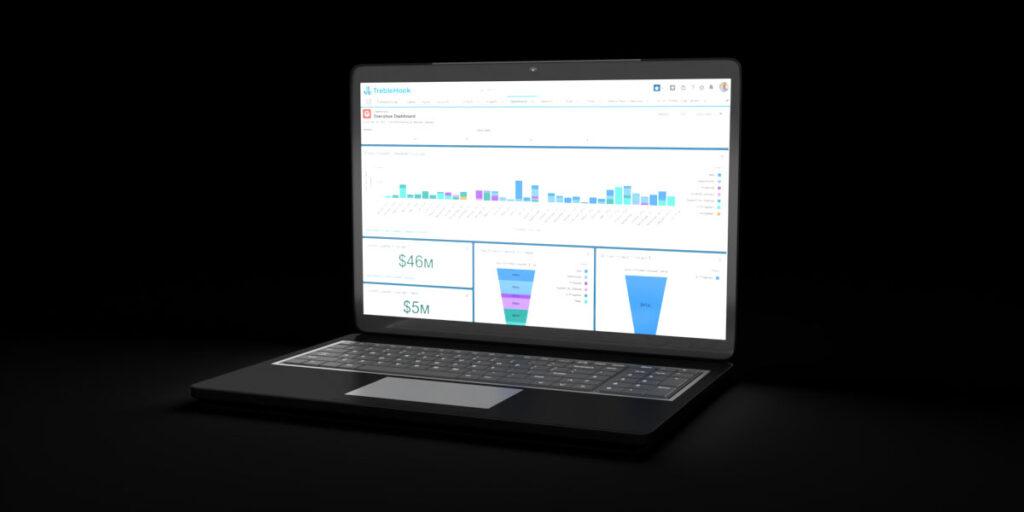
Introduction: Embracing CRM in the Digital Construction Era
Welcome to the digital revolution in construction, where mastering CRM is as important as building a strong foundation. In “CRM in Construction: Building Digital Bridges,” we discuss how CRM helps in managing the complex construction industry.
This guide explores the basics of CRM, its use in construction, and how it’s changing client interactions and business growth. Discover how CRM manages and changes relationships, share insights on implementing CRM effectively, and explore upcoming industry trends. Together, let’s embark on a journey to reshape the industry’s future with CRM.
Quick Links
- Understanding CRM Basics
- The Role of CRM in Construction
- Implementing Construction CRM
- CRM at Work in Construction
- Looking Ahead – The Future of CRM in Construction
- Conclusion: Reinforcing the Pillars of Construction with CRM
Section 1: Understanding CRM Basics
What is a CRM?
Customer Relationship Management (CRM) is a system that enables businesses to handle, understand, and improve their relationships with both current and future clients. Acting as a versatile tool, CRM combines the functions of a database, a communication center, and an analysis tool. It efficiently stores and organizes customer contact information, communication history, and sales details, streamlining business operations and enhancing customer service.
Beyond being a digital repository, CRM serves as both a strategy and technology that aids in nurturing relationships with customers and prospects. It plays a crucial role in enhancing customer engagement and fostering business growth. By collecting and analyzing data on customer interactions, CRM systems allow businesses to tailor their communication, offering personalized experiences that cultivate customer loyalty and satisfaction.
CRM in the Construction Industry
In the construction industry, where projects are large, timelines are long, and the stakes are high, CRM takes on an even more critical role. CRM systems specific to construction tailor themselves to address the unique challenges and complexities of the industry. These systems not only manage client information but also integrate with other tools for project management, bidding, and financial forecasting.
This integration helps construction companies see everything they do, including managing clients, tracking projects, and growing their business. With a construction CRM, you can track the lifecycle of a project, from the initial client inquiry and bid preparation to project completion and post-construction follow-ups. This comprehensive approach ensures that no detail is overlooked and every client interaction adds value to the business relationship.
In essence, CRM in construction serves as a crucial bridge across different areas of business operations. It enables construction professionals to forge stronger, data-driven relationships with clients. Additionally, it streamlines project management processes. Ultimately, this lays the foundation for sustained business growth and success.
Section 2: The Role of CRM in Construction
Centralizing Project and Client Data
In construction, where multiple projects often run simultaneously with many moving parts, centralizing project and client data is essential. A construction CRM acts as a unified repository, bringing together crucial details such as client communication, project timelines, budgetary constraints, and progress reports.
This unified system ensures that all team members, from project managers to sales teams, access the same current information, leading to consistent client interactions and project management. Beyond being merely a data storage system, a construction CRM merges information from diverse sources, providing a complete view of each client and project. This holistic perspective enhances decision-making and strategic planning. For example, understanding a client’s history, preferences, and feedback informs more personalized approaches in subsequent projects, thereby boosting client satisfaction and loyalty.
Enhancing Client Relationships
In an industry where each client interaction can lead to significant projects, enhancing and personalizing these relationships is vital. CRM in construction goes beyond mere transactional interactions. It allows for the creation of personalized client journeys. CRM makes sure every client feels valued and understood with personalized emails and reminders for important dates.
A CRM system also equips construction firms with tools to respond promptly to client queries, track the client’s history and preferences, and proactively address potential issues. By maintaining detailed records of past interactions and projects, CRM enables construction professionals to provide a more tailored service, often anticipating client needs even before they are explicitly stated.
Streamlining Operations and Enhancing Collaboration
Efficiency and collaboration are key in the construction industry. A well-implemented CRM system streamlines various operational processes, such as bid and contact management, project tracking, and follow-ups. It automates repetitive tasks like data entry, follow-up reminders, and report generation, freeing up valuable time for more strategic activities.
Moreover, CRM fosters collaboration not just within the company but also with clients, suppliers, and subcontractors. By offering key features like shared calendars, task management, and real-time project updates, a CRM system ensures that all stakeholders are on the same page. This reduces misunderstandings and enhances the efficiency of project execution.
Leveraging Data for Strategic Advantage
In today’s data-driven world, leveraging analytics for strategic advantage is non-negotiable. Construction CRM systems come equipped with analytics tools that transform raw data into actionable insights. These insights can inform everything from individual project decisions to long-term business strategies.
For instance, analyzing win/loss ratios in bidding processes can reveal areas for improvement, while client feedback and behavior patterns can inform marketing strategies and service offerings. Predictive analytics can even forecast market trends, helping construction firms stay ahead of the curve.

Section 3: Implementing Construction CRM
Selecting the Appropriate CRM System
Choosing the right CRM for your construction business is a critical decision that can significantly impact your operations and client relationships. Here are key factors to consider:
- Features and Functionality: Look for a CRM that offers features specifically beneficial for construction, such as project tracking, lead management, bid management, and integration with construction management software.
- Scalability: As your business grows, your CRM should be able to grow with you. Choose a system that can accommodate an increasing number of clients and projects without sacrificing performance.
- User Experience: The CRM should be user-friendly and intuitive. If the system is too complicated, it risks low adoption rates among your team.
- Cost: While cost shouldn’t be the only factor, it’s important to consider your budget. Weigh the CRM’s benefits against its cost to ensure a good return on investment.
- Customization: Every construction company is unique. A CRM that allows customization to fit your specific business processes and workflows can be a game-changer.
Training and Adoption Techniques
Implementing a new CRM system is only successful if your team fully adopts and utilizes it. Here are strategies to ensure effective CRM adoption:
- Comprehensive Training: Invest in thorough training sessions for your team. Ensure that everyone understands how to use the CRM effectively.
- Phased Rollout: Consider implementing the CRM in phases. Start with basic features and gradually introduce more complex functionalities as your team gets more comfortable.
- Internal Champions: Identify CRM champions within your team who can assist others, provide support, and encourage usage.
- Feedback and Adjustments: Regularly gather feedback from your team on the CRM’s performance and usability. Be open to making adjustments based on their input.
Overcoming Implementation Challenges
Adopting a new system can come with challenges. Anticipate and plan for potential obstacles:
- Resistance to Change: Change can be difficult. Overcome resistance by explaining the advantages of CRM and how it will simplify and improve your team’s work.
- Data Migration: Migrating data to a new CRM can be a daunting task. Plan this process carefully to ensure data accuracy and integrity.
- Integration with Other Systems: Ensure the CRM integrates seamlessly with your existing systems to avoid disruptions in your workflow.
Monitoring and Evaluating Success
Once your CRM is in place, it’s important to monitor its impact and evaluate its success:
- Track Usage and Engagement: Regularly monitor how your team is using the CRM. Low engagement might indicate a need for additional training or system adjustments.
- Analyze Performance Metrics: Evaluate the CRM’s impact on your business through key performance indicators like project turnaround time, client satisfaction, and sales growth.
- Continual Improvement: A CRM is not a set-it-and-forget-it tool. Always look for ways to improve its use and ensure it evolves with your business needs.
Section 4: CRM at Work in Construction
Success Stories and Case Studies
In this part, we explore how CRM systems have transformed the operations and client relationships of various construction companies. We will show how a good CRM can help the construction industry through real-life examples.
- Improve Data Accessibility: Learn how Eco Engineering improved their project data accessibility, decreasing their forecasting time from two weeks to a day.
- High Adoption: Discover how O’Neal, Inc.’s business development and marketing teams quickly adopted CRM to streamline their sales process and document management.
These stories will not only showcase the diverse applications of CRM in construction but also serve as a source of inspiration and practical insight for companies considering CRM adoption.
Section 5: Looking Ahead – The Future of CRM in Construction
Emerging Trends and Innovations
The construction industry is on the brink of a new era of digital transformation, and CRM systems are at the forefront of this change. In this section, we’ll examine the emerging trends and technological innovations that are shaping the future of CRM in construction:
- Integration of AI and Machine Learning: Discover how AI and machine learning are being integrated into CRM systems to provide advanced analytics, predictive insights, and even more personalized customer experiences.
- Enhanced Mobile Accessibility: As construction professionals are often on-site, the evolution of CRM mobile platforms is crucial. We’ll explore how enhanced mobile features are enabling real-time data access and decision-making.
- IoT and CRM: Learn how the Internet of Things (IoT) is beginning to intersect with CRM systems, offering new ways to track and manage construction assets and workflows.
Adapting to Evolving Industry Needs
The construction industry is dynamic and constantly evolving with new trends and technologies. To keep pace, it’s vital that CRM systems in construction do the same. This section explores strategies for ensuring your CRM remains responsive and relevant.
- Continuous Learning and Adaptation: Embrace a culture of continuous learning within your organization. Regularly update your CRM strategies to reflect industry changes and shifting client expectations. Motivate your team to learn about new CRM features and use them to improve client interactions and project management.
- Staying Ahead of the Curve: Staying informed about new CRM features and best practices is crucial. Subscribe to industry newsletters, attend webinars, and participate in relevant workshops. Using advanced CRM tools improves efficiency and keeps you competitive in a tech-savvy market.
- Preparing for the Future: Future-proof your CRM approach by being open to innovation. Invest in regular training for your team to ensure they are adept at using new technologies. Be open to changing technology, knowing that what works now may not work in the future as the industry changes.
Construction businesses can keep their CRM systems strong, flexible, and in line with the changing construction industry by using these strategies.
The Role of CRM in Sustainable and Green Building Practices
As the construction industry shifts towards sustainability and green building practices, CRM systems emerge as vital tools in this transformation. This section delves into how CRM can enhance and promote sustainable practices in construction.
- Managing Sustainable Practices: CRM systems can be instrumental in managing a company’s sustainable practices. By integrating data related to eco-friendly materials, energy-efficient processes, and waste reduction methods, CRM helps construction businesses monitor and improve their sustainable practices effectively.
- Tracking Environmental Impact: A key feature of modern CRM systems is their ability to track and analyze environmental impact. By monitoring aspects such as resource usage, carbon footprint, and waste management, CRM provides valuable insights that guide construction companies in making more environmentally responsible decisions.
- Communicating Sustainability Efforts: Effective communication of green initiatives is crucial for construction companies. CRM systems enable the sharing of sustainability achievements with clients and stakeholders through automated reports and personalized communication. This not only demonstrates a company’s commitment to sustainability but also enhances its reputation in the market.
Construction companies can simplify sustainable practices and demonstrate their dedication to the environment by using CRM. This aligns with the global focus on green building.

Conclusion: Reinforcing the Pillars of Construction with CRM
CRM in construction is not just a tech tool. It is also a helpful partner in the digital era of building and construction. CRM systems, such as TrebleHook, are crucial for enhancing efficiency, client focus, and innovation in the construction industry. They achieve this by centralizing data, improving client relationships, and preparing for future technological advancements.
The implementation of CRM in construction goes beyond mere organization of client data. It represents a fundamental shift in how construction businesses engage with their clients, manage projects, and forecast future opportunities. As we’ve seen through various case studies and real-world applications, the right CRM system can transform operational efficiency, client satisfaction, and, ultimately, business profitability.
As the industry continues to evolve, staying ahead of the curve with tools like TrebleHook will be key to thriving in an increasingly competitive and fast-paced market. The future of construction CRM is bright, with innovations like AI, machine learning, and IoT integration offering new possibilities for growth and efficiency.
Discover the Future of Construction CRM with TrebleHook
Ready to take your construction business to the next level? Discover how TrebleHook can revolutionize your client relationships, project management, and overall business strategy. With our specialized AEC CRM, you’ll have the tools to build stronger connections, streamline your operations, and stay ahead in the dynamic world of construction.
Don’t miss the opportunity to see TrebleHook in action. Request a demo today and experience firsthand the transformative power of a CRM designed specifically for the construction industry. Whether you’re looking to enhance client relationships, improve operational efficiency, or gain a competitive edge, TrebleHook is your partner in building a more successful future.

Recent Comments